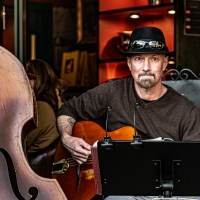DjangoBooks.com
Welcome to our Community!
Categories
- 20K All Categories
- 1.1K General
- 484 Welcome
- 59 Archtop Eddy's Corner
- 146 CD, DVD, and Concert Reviews
- 385 FAQ
- 26 Gypsy Jazz Italia
- 27 Photos
- 209 Gypsy Picking
- 21 Unaccompanied Django
- 15 Pearl Django Play-Along Vol.1
- 17 Gypsy Fire
- 45 Gypsy Rhythm
- 1.4K Gypsy Jazz University - Get Educated
- 131 Gypsy Jazz 101
- 230 Repertoire
- 226 History
- 709 Technique
- 51 Licks and Patterns
- 6 Daniel Givone Manouche Guitare Method Users Group
- 20 Eddie Lang Club
- 1.3K Gypsy Jazz Gear
- 812 Guitars, Strings, Picks, Amps, Pickups and Other Accessories
- 463 Classifieds
- 51 Recording
- 62 Other Instruments
- 18 Violin
- 5 Mandolin
- 22 Accordion
- 7 Bass
- 10 Woodwinds
- 351 Gypsy Jazz Events
- 144 North America
- 112 Europe
- 95 International










Comments
I agree, and I think it was quite likely that Django was much like Wes Montgomery and Bix and countless other jazz greats: although they couldn't read formal music off the treble clef, they knew the chord names for at least the major, minor and dominant chords... probably not elaborate modern voicings like you see today on lead sheets, like Db7b5#9b13... I don't know what the hell to make of chords like that, and I seriously doubt that Django or Wes or Bix did either.
But if the bandleader told any of those guys, "Look, at the end of the first chorus, I want you to play a four bar break over a Bb7 chord, to lead us into the next chorus in Eb." I think all three of them would have understood perfectly.
The question I ask myself is what Django would do if he were to come back today and you were to hand him a "grille" type chord chart for some sixties tune... just for the hell of it, let's say it were "The Shadow of Your Smile", a tune with a fair number of chord changes...
Based upon my experience over the years with some guitar players I've met who are great players but semi-literate at any kind of reading, I think he would've had a LOT of trouble following the chart by sight... but after he'd heard the tune a time or two, he'd play it totally great!
Edgar Degas: "Only when he no longer knows what he is doing does the painter do good things.... To draw, you must close your eyes and sing."
Georges Braque: "In art there is only one thing that counts: the bit that can’t be explained."
"It's a great feeling to be dealing with material which is better than yourself, that you know you can never live up to."
-- Orson Welles
I agree with Klaatu that the chart shouldn't become a crutch, but it is a necessary evil... trying to jam with players who can't read charts limits you to only playing the tunes which they already know!
Which is okay if they know a lot of tunes, but I find that often the non-chart readers don't know a lot of tunes.
Edgar Degas: "Only when he no longer knows what he is doing does the painter do good things.... To draw, you must close your eyes and sing."
Georges Braque: "In art there is only one thing that counts: the bit that can’t be explained."
Old world craftsmanship is a beautiful thing.
I've never heard Django play a note without commitment.
The same would most probably be true for Bireli. To me that's what music is about: hearing, second to reading.
ts
I think you would soon throw the chart away willingly if Django were playing with you, because his knowledge of music would, within minutes or seconds, provide you with innovations that are there in the arrangement but undiscovered, unless your crazy for pedagogy.
The problem wouldn't be "how fast can he learn this?" but "how much embarrassment can I tolerate and how fast can I adapt?" Within a month, you'd be wondering: "What does musical education in popular genres really consist of?"
Django did not read music. He was music!
youtube.com/user/TheTeddyDupont
"There is no such thing as musical theory--theory is just 'words' we use to describe the musical 'sounds' we hear"
Django 'heard' everything he wanted to hear--we are are talking about 'sound' here---why do we feel the need to attach verbal vocabulary to such things?
i'm absolutely sure he didn't think ....urghh.... "what tritone arpeggio do i play on the middle eight of Anniversary Song".You may as well subject birdsong to the same absurd anaysis!
In the most wonderful way-- Django was one of the most 'educated' musicians there has ever been.That should be enough.
Stu
well, some of us teach, so "just listen" sometimes needs a little reinforcement 8)
I've never heard Django play a note without commitment.